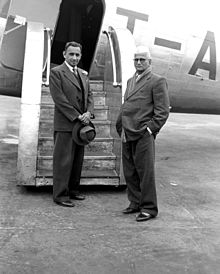C.D. Deshmukh
|
Sir Chintaman Dwarakanath Deshmukh CIE, ICS |
|
|---|---|

C. D. Deshmukh at Palam airport in 1952 (left)
|
|
| Minister of Finance | |
|
In office 29 May 1950– 24 July 1956 |
|
| Prime Minister | Jawaharlal Nehru |
| Preceded by | John Mathai |
| Succeeded by | T. T. Krishnamachari |
| 3rd Governor of the Reserve Bank of India | |
|
In office 11 August 1943 – 30 June 1949 |
|
| Preceded by | James Braid Taylor |
| Succeeded by | Benegal Rama Rau |
| Personal details | |
| Born |
14 January 1896 Nate, Mahad, Raigad, Maharashtra |
| Died | 2 October 1982 (aged 86) Hyderabad, Andhra Pradesh |
| Nationality | Indian |
| Spouse(s) | Rosina 1919-49 (her death) Durgabai 1953- 1981 (her death) |
| Children | 1 |
| Alma mater | University of Cambridge |
| Religion | Hindu |
| Awards | Padma Vibushan 1975 |
Sir Chintaman Dwarakanath Deshmukh, CIE, ICS (14 January 1896 – 2 October 1982) was an Indian civil servant and the first Indian to be appointed as the Governor of the Reserve Bank of India in 1943 by the British Raj authorities. He subsequently served as the Finance Minister in the Union Cabinet (1950–1956). It was during this time that he also became a founding member of the Governing Body of NCAER, the National Council of Applied Economic Research in New Delhi, India's first independent economic policy institute established in 1956 at the behest of Prime Minister Jawaharlal Nehru. After resignation from Union Cabinet he worked as Chairman of UGC(1956–1961). He served as Vice-Chancellor of University of Delhi (1962–67). He was also President of Indian Statistical Institute from 1945 to 1964, Honorary Chairman of National Book Trust (1957–60). He founded India International Center in 1959 and served as Lifetime President of it. He was also chairman of Indian Institute of Public Administration.
Chintaman Deshmukh was born in a Marathi-speaking family to Dwarakanath Ganesh Deshmukh, a lawyer and Bhagirathibai on 14 January 1896 in Nategaon, near Fort Raigad, Maharashtra. He was schooled at Roha and Tala and at the Elphinstone High School, Bombay. In 1912, Deshmukh passed the Matriculation Examination of the University of Bombay with record marks and secured the first Jagannath Shankarseth Scholarship in Sanskrit. In 1915 he went to England and graduated with a degree in Natural Sciences Tripos from Jesus College, Cambridge in 1917. He was awarded the Frank Smart Prize in Botany and was also president of the Majlis Society. In 1918 he sat for, and topped, the Indian Civil Service Examination, then held only in London.
...
Wikipedia
